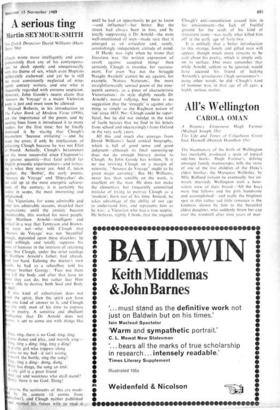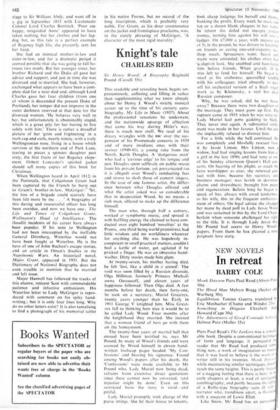All's Wellington
cA ROLA OMAN A Regency Elopement Hugh Fa rmar (Michael Joseph 35s)
The Life and Times of Colgultoun Grant Jock Haswell (Hamish Hamilton 45s)
The bicentenary of the birth of Wellington has inevitably produced a spate of topical side-line books. Hugh Farmar's, delving amongst family manuscripts, tells the story of one of the five children of the Duke's eldest brother, the Marquess Wellesley. by Mlle Rolland (whom he eventually but un- wisely married). Wellington took a bene- volent view of their brood—'All the boys were tine fellows and the girls handsome and accomplished'—and really the brightest spot in this rather sad little romance is the kindness shown by him to the beautiful eldest daughter, who suddenly threw her cap over the windmill after nine years of mar-
riage to Sir William. Abdy, and went -off in a gig in September 1815 with Lieutenant- Colonel Lord Charles Bentinck. 'Poor un- happy, misguided Anne' appeared to have taken nothing but her clothes and her lap- dog but, as this tale is a perfect example of Regency high life, she presently sent for her harp.
She had an inimical mother-in-law and sister-in-law, and for a dramatic period it seemed possible that she was going to fall be- tween two stools. But her younger sister, her brother Richard and the Duke all gave her advice and support, and just in time she was divorced and re-married. She had, however, exchanged what appears to have been a com- plete dud for a near-dud and, although Lord Charles gave her four children (from one of whom is descended the present Duke of Portland), her temper did not improve in the outer darkness reserved at that date for the divorced woman. 'He behaves very well to her, but unfortunately is abominably stupid, which is a great pity for her having to live solely with him.' There is rather a dreadful picture of her 'grim and frightening' in a mob cap and curls, nearly ninety, with a truly Wellingtonian nose, living in a house which survives at the northern end of Park Lane, tearing to pieces a spinster daughter past sixty, the first fruits of her Regency elope- ment. Osbert Lancaster's spirited jacket should sell many copies of this book for Christmas.
When Wellington heard in April 18121-in the Peninsula, that Colquhoun Grant had .been captured by the French he burst
to Grant's Grant's brother-in-law, McGrigor 'Sir, the loss of a brigade could scarcely have been felt more by me . . .' A biography of this daring and resourceful officer has long been overdue, and now we have one: The Life and Times of Colquhoun Grant, Wellington's Head of Intelligence. The floodlit incidents of his career have always been popular. If his note to Wellington had not been intercepted by the ineffable General Dornberg, Waterloo would not have been fought at Waterloo. He is the hero of one of John Buchan's escape stories, and an article in Oman's Studies in the Napoleonic Wars. An historical novel, Major. Grant, appeared in 1931. But the Dictionary of National Biography does not - even _trouble to mention that •he married and left issue.
Major Haswell has followed the tracks of this elusive, reticent Scot with commendable patience and infective enthusiasm. His Waterloo letter to Lady McGrigor is repro- duced with comment on his spiky hand- writing; but it is only four lines long. Why do no other letters exist? It is also tantalising to find a photograph of his memorial tablet in his native Forces,. but no record af .the long inscription, which is probably very noble. For Grant, as his dour countenance on the jacket and frontispiece proclaims, was, in the stately phrasing of McGrigor, 'A character of the most rigid morality.'







































 Previous page
Previous page